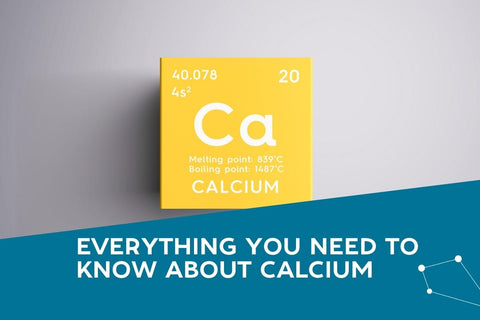Why is calcium important?
Calcium plays important roles in maintaining bone health and strength, as well as heart health and neuromuscular function. Insufficient intake of calcium later in life increases the risk of osteoporosis which remains a significant issue in today's society. Osteoporosis increases the risk of sustaining a fracture of the hip and spine which can result in significant debility. Hip fracture in particular carries a high mortality risk - up to half of people with hip fracture will die within 12 months.
What is the recommended calcium intake for bone health?
The National Health and Medical Research Council (NHMRC) of Australia recommends a daily intake of 1000mg dietary calcium for men and women up to the age of 50. The recommended calcium intake increases to 1300mg per day for women over the age of 50 and men over the age of 70. Women have a higher calcium requirement from 50 to 70 years of age than men due to the hormonal changes of menopause that place women at higher risk of osteoporosis than men.
A large survey conducted in 2011 - 2012 showed than the average dietary intake for people over age 50 fell well short of the Recommended Dietary Intake (RDI) with an average intake of less than 800mg daily for both men and women.
Should I use a calcium supplement?
Appropriate levels of calcium intake can be achieved from the diet alone if a concerted effort is made to choose calcium rich food sources. The richest sources of calcium are dairy foods. People who don't eat much dairy should consider calcium supplements, especially if they are older as the benefits of supplementation increase with age.
The 2011 - 2012 National Nutrition and Physical Activity Survey conducted by the Australian Bureau of Statistics found that nearly three quarters of women and half of all men did not meet their Estimated Average Requirement (EAR) for daily intake of Calcium.
The peak body for General Practitioners in Australia, the RACGP, recommends that calcium supplements should not be used routinely by 'non-institutionalised elderly people' because the benefit is low in terms of bone health outside this population. However, it is known that use of calcium and vitamin D supplements in combination is effective at reducing fracture risk in those who are deficient.
Side effects and potential harms of calcium supplementation
Taking excessive amounts of calcium supplements can increase the risk of developing kidney stones. However, because calcium absorption decreases proportionately with intake, adding 1000mg to a typical western diet will only increase urine calcium by about 60mg and the risk of developing kidney stones with supplements is therefore considered negligible.
Which calcium supplements are best?
Calcium citrate supplements can be safer and better absorbed, whereas calcium carbonate absorption is largely dependent on the amount of acid in the stomach and can be affected by meal consumption.
References:
1. Nutrient Reference Values for Australia and New Zealand: Calcium. Available from: https://www.nrv.gov.au/nutrients/calcium
2. RACGP: Calcium and Vitamin D supplementation. Available from: https://www.racgp.org.au/clinical-resources/



